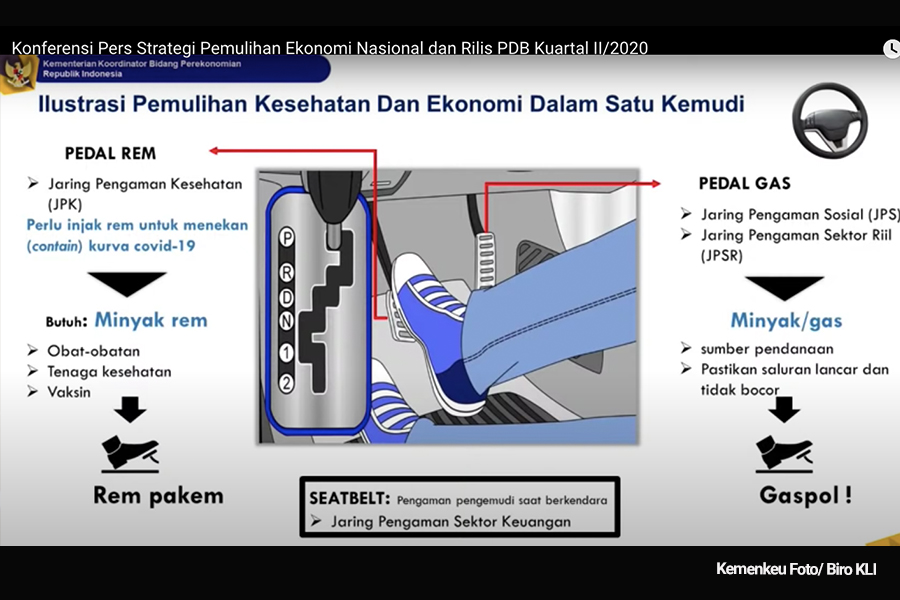Gov’t to Accelerate Spending to Address Worst Contraction

Slide show presentation during a press statement of the Coordinating Minister for Economic Affairs, Wednesday (5/8). (Photo by: Ministry of Finance)
The Central Statistics Agency (BPS) recorded that Indonesia’s economy contracted by 5.32 percent in the second quarter of 2020 – far deeper than the comparison between the economy in the first quarter of 2020 and the same period last year which was at 1.26 percent.
“COVID-19 transmission in Indonesia and many other countries has not shown a sign of slowing yet. The health crisis brings significant impact to the sectors of social, economy, and finance since social restrictions have been imposed to prevent the spread of COVID-19,” Coordinating Minister for Economic Affairs Airlangga Hartarto said in a Press Conference on the Strategies to Recover National Economy and Increase Economic Growth, Wednesday (5/8), Jakarta.
Many other countries also suffer from economic contraction. In fact, the United States, Germany, France, Italy, and Singapore are facing recession since their economic has shown a negative growth in the second quarter of 2020, after showing contraction in the first quarter.
Social restrictions has disrupted economic activities and brought huge impact to Indonesia’s economic growth. Household spending, as the largest contributor to the economic growth sharply fell in the second quarter. Large-scale Social Restrictions imposed in many provinces and regencies/cities has disrupted the economy that the public limit their household spending. Contraction in household spending also worsens the economy amidst a limited investment and international trade.
In addition, trade and manufacture sectors also significantly impacted by the pandemic since both sectors absorbed most of Indonesia’s employment so that the decline brought considerable impact to people’s income and consumption.
Transportation and warehouse sector suffered the most contraction with 30.84 percent due to work from home policy, restriction of mudik (exodus before Eid), and sharp decline in cargo activities during the pandemic.
“On the other hand, agricultural sector grows by 2.19 percent, while information and technology sector increased by 10.88 percent,” the Coordinating Minister said.
Based on the latest leading indicator, Indonesia’s economy in June has started to move, reflecting by the Indonesia Manufacturing Purchasing Managers Index (PMI), vehicle sales volume, retail sales volume, and the Consumer Confidence Index (IKK).
A positive sign also reflected by inflation meaning that consumers demand has increased, as well as exports of Indonesia’s main commodities and financial sector.
To address the contraction, the Government must take several extraordinary measures to stimulate the economy in the third and fourth quarters of 2020 and to avoid a recession.
“The Government, public, and business sector including the State-owned Enterprises must participate in that measures,” he said.
The main strategies in accelerating economic recovery are increasing government expenditure, optimizing government expenditure through the implementation of National Economic Recovery Program (PEN), increasing people’s purchasing power, and supporting sectors considered to help the economic recovery during the third and fourth quarters.
The Government has also established COVID-19 Handling and National Economic Recovery Committee which is expected to improve coordination and policy implementation in addressing COVID-19 pandemic and recovering national economy so that the target in health and economic sectors can be met at the same time.
Programs to handle COVID-19 which are implemented in a more serious and structured manner are expected to regain people’s trust to do outside activities including buy goods/services, and make investment.
The programs on health aspect, cover:
- Increasing 3T (Testing,Tracing,Treat), intensifying 3M campaign (Washing hands, Wearing Mask, Keeping safe distance) to the public by involving all layers of society.
- Procuring drug, producing and distributing vaccine next year.
“Through National Economic Recovery Programs, the Government is committed to maintain people’s purchasing power and domestic demand. People’s purchasing power will be maintained through distribution of social assistance and subsidy programs, while stimulus is provided to business sector to maintain domestic demand,” Airlangga said.
Stimulus for the business sector to accelerate the national economic recovery are:
- Loan that is given to Micro, Small, and Medium-sized Enterprises and labor intensive corporation for business capital;
- Deposit facility in publicly listed Bank Pembangunan Daerah that will be disbursed to real sector, MSMEs, and business sector;
- Regional government loans; and
- Electricity incentives for industry, business, and social sectors.
In this time of crisis, Indonesia to uphold three programs, namely:
- Safe and healthy Indonesia, to build people’s trust.
- Empowered and Working Indonesia, to increase purchasing power and open more employment.
- Growing and Transforming Indonesia, to take this momentum and turn the pandemic into opportunities. (Coordinating Ministry of Economic Affairs/EN)
Translated by: Rany Anjany
Reviewed by: Yuyu Mulyani








